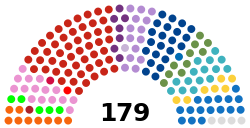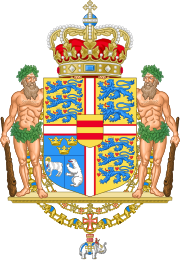Parliament of Denmark Folketinget (Danish) | |
|---|---|
| 72nd Folketing | |
 | |
| Type | |
| Type | |
| Leadership | |
Deputy Speakers | |
| Structure | |
| Seats | 179 |
 | |
Political groups | Government (86)[1]
Opposition (88)
|
| Elections | |
| Open list proportional representation through the D'Hondt method with a 2% election threshold in constituencies See Elections in Denmark | |
Last election | 1 November 2022 |
Next election | On or before 31 October 2026 |
| Meeting place | |
 | |
| Folketingssalen, Christiansborg Palace, Copenhagen | |
| Website | |
| thedanishparliament | |
 |
|---|
The Folketing (Danish: Folketinget, pronounced [ˈfʌlkəˌtsʰe̝ŋˀð̩]; lit. 'The people's thing' or 'People's assembly'), also known as the Parliament of Denmark or the Danish Parliament in English,[5] is the unicameral national legislature (parliament) of the Kingdom of Denmark—Denmark proper together with the Faroe Islands and Greenland. Established in 1849, until 1953 the Folketing was the lower house of a bicameral parliament, called the Rigsdag; the upper house was the Landsting. It meets in Christiansborg Palace, on the islet of Slotsholmen in central Copenhagen.
The Folketing passes all laws, approves the cabinet, and supervises the work of the government. It is also responsible for adopting the state's budgets and approving the state's accounts. As set out in the Constitution of Denmark, the Folketing shares power with the reigning monarch. But in practice the monarch's role is limited to signing laws passed by the legislature; this must be done within 30 days of adoption.
The Folketing consists of 179 members; including two from Greenland and two from the Faroe Islands. General elections must be held every four years, but it is within the powers of the prime minister to ask the monarch to call for an election before the term has elapsed. On a vote of no confidence, the Folketing may force a single minister or the entire government to resign.[6]
Members are democratically elected by proportional representation: 135 directly in constituencies using the D'Hondt method and with 40 leveling seats. The Danish political system has traditionally generated coalitions. Most post-war governments have been minority coalitions ruling with the support of non-government parties.[7] The first sitting of the house is usually attended by The King.[8]
- ^ "Danmark får ny regering: "Det betyder ikke, vi er enige om alt"". Altinget.dk (in Danish). 13 December 2022. Retrieved 13 December 2022.
- ^ Hoffmann-Hansen, Henrik. "Alle nordatlantiske folketingsmedlemmer støtter regeringen". Kristeligt Dagblad (in Danish). Retrieved 5 August 2024.
- ^ Høj, Olivia; Pabst, Mette (25 August 2023). "Efter undren fra Løkke: Jon Stephensen forsvarer, at han beholder sit mandat". dr.dk.
Jon Stephensen siger, at han vil stemme med SVM-regeringen langt hen ad vejen, men han vil ikke love, at han vil stemme med regeringen hver gang.
- ^ Astrup, Peter (20 November 2023). "Regeringen har sikret flertallet: Har lavet aftale med Jon Stephensen". www.bt.dk (in Danish). Retrieved 20 November 2023.
- ^ "About the Danish Parliament". thedanishparliament.dk. The Danish Parliament. Archived from the original on 25 August 2015. Retrieved 23 August 2015.
- ^ "A Minister shall not remain in office after the Parliament has passed a vote of no confidence in him." The Constitution of Denmark – Section 15.
- ^ "Radikale ved historisk skillevej". Berlingske Tidende. 17 June 2007. Retrieved 17 August 2007.
- ^ "The Danish Parliament opens on 6 October". thedanishparliament.dk. Folketinget (The Danish Parliament). Archived from the original on 28 April 2016. Retrieved 13 April 2016.
Cite error: There are <ref group=lower-alpha> tags or {{efn}} templates on this page, but the references will not show without a {{reflist|group=lower-alpha}} template or {{notelist}} template (see the help page).